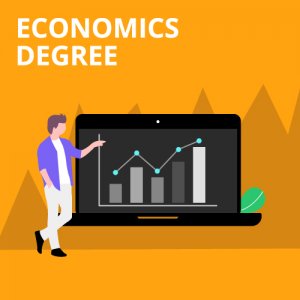What Kind of Accreditation Should My Degree Program Have?
To be sure that future employers will be interested in your degree, it is important to know that your school has the appropriate accreditation.
For any higher education discipline, particularly for Economics, accreditation is crucial when choosing an institution.
The college or university is eligible for financial support if the Department of Education has recognized an association that provided the accreditation.
First of all, accreditation shows that an educational institution adheres to the standards.
Secondly, the program is relevant and continues to expand in its field.
There are institutional and programmatic accreditation processes.
One is required for schools, the other for a specific discipline and degree program.
Regional Accrediting Agencies
Regional and national accreditation agencies can provide institutional accreditation.
In short, regional accreditation agencies enhance reputation and credibility.
When studying the conditions of colleges and universities, it is advisable to obtain a “stamp of approval” from one of these accreditation agencies depending on the region:
- The Higher Learning Commission
- Middle States Commission on Higher Education
- New England Association of Schools and Colleges
- Northwest Commission on Colleges and Universities
- Southern Association of Colleges and Schools Commission on Colleges
- Western Association of Schools and Colleges
National Accrediting Agencies
A degree in economics offers many career opportunities.
So a seal of approval from one of the national freight forwarders is not required.
However, the accreditation of the best national business association will confirm the conformity and quality of your professional development program.
In addition, a bachelor’s degree program that is recognized by the best business school accreditor is required if you plan to continue your studies at a master’s level.
The association to advance collegiate schools of business (AACSB international) is a high level of accreditation for U.S. business schools everywhere.
Only about a quarter of all business schools receive this quality mark.
The AACSB offers accreditation to students who are taking a business administration and accounting program in economic specialties.
To determine accreditation status, you simply need to contact the chosen school.
Chiefly, the database of the department of education contains all accredited companies within its competence.
If you know about accreditation, you can consider several options for obtaining a degree.
What Kinds of Economics Degrees Are There?
Associate Degree and/or Certificate in Economics
An associate degree in economics is an excellent basis for further study.
The program will give you an understanding of the basics of the economy, although with this degree you cannot apply for a better-paid job.
You will study macro and microeconomics in theory as well as practical subjects such as water business courses and applied mathematics.
The Associate Program requires 60 credits or two years of internship.
After that, you will be ready to work in the banking sector or in a large company for accounts receivable.
Some certification programs also offer similar educational programs.
Sometimes even certificates from accredited schools are not considered to be accredited.
In general, you will benefit more from your Junior Professional degree, even though it will cost you a little more.
It is also the basis for a bachelor’s degree in a four-year program.
What Courses Will You Take?
- Macroeconomics
- Microeconomics
- Business Calculus
- Business Statistics
- Financial Accounting
- International Business
Bachelor of Economics
A bachelor’s degree is designed for 120 credits, which means four years in college.
This level gives students a better understanding of the economy.
In addition to the main macro- and microeconomics class, you will consider some of the mathematical technical topics of your discipline.
You will also have the opportunity to get acquainted with individual directions in this area.
Typically, undergraduate students get an opportunity to do important independent researches.
This is a good option for you, whether you just want to do business administration and economics or plan to work at a managerial level in the bank, business, financial sector.
What Courses Will You Take?
- Macroeconomic Analysis and Policy
- Microeconomic Analysis
- Econometrics
- Labor and Industrial Organizations
- Money and Banking
- Calculus and Statistical Analysis
What’s the Difference Between a BA and a BS in Economics?
Likewise, a Bachelor of Arts (BA) and a Bachelor of Science (BS) degree in economics give students an elementary and advanced economic education.
But unlike a bachelor of arts, a bachelor of science focuses on the application of mathematical analysis.
Meanwhile, the Bachelor of Arts draws attention to the idea and theory of economics, including international relations, historical events and contemporary developments in the context of the course.
Master of Economics
There are two specific Master’s Degrees in Business Administration and a Master’s Degree in Economics for those who pursue a degree in economics.
Those interested in the theoretical aspect of the discipline can take advantage of the opportunity to obtain a master’s degree in economics.
This second-level program provides more information and qualifications in your discipline and includes a master’s thesis.
It can also serve as a basis for a scientific article or a whole book.
But don’t think that a master’s degree is only for scientists.
After all, many of the banks’ analytical centers hire people with higher economic education.
Usually takes 2 years to complete, although sometimes it may take one year to complete.
What Courses Will You Take?
- Financial Economics
- Public Economics
- Health, Education, and Welfare
- Economic History
What’s the Difference Between an MA and an MS in economics?
A similar option with a bachelor of arts and a bachelor of science.
If you are interested in the humanities and economic theories, you can take the opportunity to obtain a master’s degree in economics.
Master of Science teaches scientific principles and mathematical operations that are part of the economy.
Ph.D. in Economics
The ultimate degree is a Ph.D. in Economics.
Usually, this program takes from 3 to 5 years.
Before that, candidates are to be trained at the Master’s level for 2 years and write their thesis.
You will have the opportunity to conduct unique research in accordance with the standards in this area and make new discoveries.
If you succeed in this difficult task, you will receive awards and recognition in the academic community.
Therefore, with your Ph.D. in economics, you will have access to popular positions in academia and on the boards of prominent companies.
It is unbelievable that you will be able to play a leading role in the development of a publication policy by a scholarship or government organization.
What Courses Will You Take?
- Economic Systems
- Environmental Economics
- Real Estate
- Labor and Demographic Economics
- Agricultural Economics
- Transportation Economics
What About Dual Degree Programs?
In most cases, students of economic faculties combine their studies with similar disciplines such as finance or law.
This is possible with double J.D. and double Ph.D. or other different combinations.
Because it’s a difficult option to get a diploma, you have to have strong nerves.
It will be easier for a motivated and patient student to get their diplomas.
The most important double diploma will highlight you among other candidates for future work.
What Kind of Licensing or Certification Do You Need?
Depending on the particular profession you wish to practise, you may need a professional license or certificate.
The economy is an extremely diverse field.
So there are a lot of fields for each of which different certificates are required.
Often a separate direction of the economy requires certification Although no special qualification is required to obtain an economist’s diploma.
Your chosen career determines which additional documents may be required.
Credit Analyst
It is clear from the name that a credit analyst approximately estimates the financial condition of a potential borrower.
At present, credit is what the modern economy works on, so it is necessary to be able to determine who is solvent and who is not to maintain the working condition of the financial world.
If you want to become a credit analyst, you should contact the national association of credit management.
The national association of credit management offers students the credit business associate program.
To do so, you need to complete three courses in financial reporting, business crediting and financial accounting at the college and take a certification exam.
Or 5 years of business experience allows you to pass the risk management associations credit risk certification exam.
Finance Officer/Loan Officer
At the height of the mortgage bubble, there were the greatest opportunities for financiers and loan officers.
At the moment there is still a great demand for credit specialists.
The usual amount of education gives the loan officer an unusually high salary.
Usually, financial or credit inspectors receive a bachelor’s and higher education degree with a job.
For example, obtaining a certificate requires 20 hours of coursework, exams, and credit or background checks
Those who work, we have to confirm their license every year, sometimes even the government sets additional requirements.
Additional training can open up new career opportunities.
This training is offered by some groups, such as the Mortgage Bankers Association or the American Banking Association.
Financial Advisor
In a way, everyone can give financial advice, but if you want your opinion to be listened to, you need a certain qualification.
You may need a certificate from the Certified Financial Planner Board of Standards to do this.
Certification of a certified financial planner (CFP) requires a bachelor’s degree and three years of relevant experience.
You will also have to take the test and adhere to a professional code of conduct.
Financial Analyst
The Financial Industry Regulatory Authority (FINRA) is a licensing organization that licenses many financial analysts and manages securities.
Most licenses related to this industry require financial support from the employer, unlike other areas of the financial industry.
Thus, before becoming an analyst you need to have some experience in the field.
Investment Banker
To become an investment banker, you need to work at a bank and register as its representative with the Financial Industry Regulatory Authority (FINRA).
If you want to qualify as an investment banker, you must pass an exam.
There are also voluntary certificates from the Chartered Financial Analyst (CFA) from the CFA Institute.
Before starting a certification or licensing program, make sure it is recognized by an authoritative association or group
Most often, you will need to complete an educational course or training to get a certificate.
Popular Degree Programs
What Can You Do With This Degree?
Your bachelor’s degree in economics gives you access to successful business research and financial career.
Some popular opportunities in this area include:
- Actuaries
- Accountants and Auditors
- Budget Analysts
- Financial Analysts
- Financial Clerks
- Insurance Underwriters
- Loan Officers
- Logisticians
- Management Analysts
- Market Research Analysts
- Meeting, Convention and Events Planners
- Operations Research Analysts
- Personal Financial Advisors
- Purchasing Managers, Buyers, and Purchasing Agents
- Statisticians
How Much Can You Make With This Degree?
Well-paid positions require specialists with a degree in economics.
According to the Bureau of Labor Statistics, in 2019 employers offer the following basic wages for the best jobs in the field:
- Market Research Analyst— Mean annual wage of $63,120
- Credit Analyst — Mean annual wage of $82,300
- Management Consultant — Mean annual wage of $83,610
- Financial Analyst — Mean annual wage of $85,660
- Actuary— Mean annual wage of $102,880
- Economist— Mean annual wage of $104,340
- Political Scientist — Mean annual wage of $117,570
- Compensation and Benefits Manager — Mean annual wage of $121,010
What Professional Associations or Societies Should You Join?
The best way to establish new connections in your field is to join a professional association.
Here you can also learn about useful seminars or contests and improve your personal knowledge.
Obviously, your chosen career path will determine which associations you decide to join.
Find out about economic associations that match your professional direction:
American Economic Association
AEA is the largest association of economists in the U.S. It has more than 20,000 members from university business and the government.
They publish authoritative scientific journals and organize professional conferences.
So it’s an important organization for everyone who works in the economy.
Econometrics Society
As a dynamic discipline of economics has changed significantly since the beginning of the 20th century, at that time it was political or philosophical in nature.
So math here is becoming more and more important.
Economic society focuses on the use of statistics and mathematics in this field by investing resources and researchers.
Summary
Now you have a more particular vision of your Economic career.
Choose your own path and start applying your talents in work.
The degree in Economics allows you to choose one or more interesting directions.
It’s a great opportunity to realize your economical potential and establish a financial balance.
See More Degrees
What can you do with a degree in...







